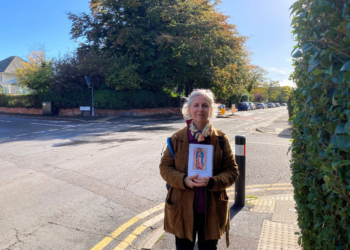Sam Bidwell is Director of Research at the Adam Smith Institute.
In our populist age, the cause of the ultra-wealthy is always a difficult one to make. In fact, as any denizen of social media will be able to tell you, the popularity of left-wing creators such as Gary Stevenson has exploded in recent months.
The former CityBank trader has made a name for himself with a candid, abrasive style, calling for a ‘wealth tax’ on Britain’s uber-rich as a way to finance our growing fiscal obligations.
But unfortunately for Stevenson and his followers, while we are an island nation, we are not isolated from the rest of the world. High net-worth individuals (HNWIs) are perfectly capable of moving elsewhere, if the UK’s policy landscape punishes them for their wealth creation – and in fact, many HNWIs are already doing just that.
According to the Adam Smith Institute’s Millionaire Tracker, Britain is set to lose more millionaires per capita than any other developed country over the course of this parliament. This wealth exodus is driven by a variety of factors, including high rates of personal tax, an unfavourable business climate, and declining standards of public safety.
One of the key drivers, though, is the Government’s decision to abolish the UK’s long-standing non-dom scheme, a financial mechanism which allowed foreign HNWIs to exempt their overseas earnings from British tax.
At its face, this system is an intuitive one: non-doms were still liable to pay tax on money that they made in the UK, and could live here without subjecting their overseas income to British tax rates. The benefits for non-doms are obvious – but the scheme also provided significant benefits for the British public at large.
As of 2024, non-doms were estimated to pay, on average, £120,000 a year in British taxes. Some are likely to have paid millions, tens of millions, or even hundreds of millions of pounds in tax on their domestic income. That’s to say nothing of the broader benefits, including investment in British businesses, and consumer spending on goods and services in this country.
When the Government announced its intention to scrap the scheme, the Adam Smith Institute was clear: scrapping the non-dom tax treatment, without introducing an alternative system for attracting HNWIs, will be a disaster for the UK’s finances. Losing thousands of millionaires over the course of this Parliament will mean losing billions of pounds both in tax revenue and investment.
Incredibly though, in implementation this bad idea is worse than first anticipated. Dig into the details of the Government’s 2024 Finance Act, and you’ll find a number of provisions which will make it practically impossible for many non-doms to remain in the UK. Two aspects in particular could drive away thousands of wealth creators over the next few years.
First, the current rules governing the transfer of assets abroad are excessively wide-ranging. In essence, if a UK resident owns a foreign company, its profits can be treated as personal income, and taxed at 45 percent.
Historically, non-doms have been shielded from this under Articles 726 and 730 of the Income Tax Act. However, the new Finance Act dismantles these safeguards, meaning that non-doms face not only full British personal taxation, but also an additional round of taxation on the profits of any foreign entities that they control.
In effect, this will lead to a tax rate of 67 percent – making it impossible for non-doms with foreign businesses to stay in the UK.
Second, the Government has proposed an interim measure, designed to encourage non-doms to invest their overseas wealth in the UK. The Temporary Repatriation Facility (TFR) offers a three-year window in which non-doms can bring money into the UK at a lower rate of tax – 12 per cent in the first two years, rising to 15 percent in the third year.
However, there is significant concern amongst HNWIs and tax lawyers that funds repatriated under the TRF will be subjected to arbitrary taxation by HMRC. In a number of recent cases, HMRC has chosen to suddenly treat tax incentive schemes as ‘avoidance’, under the revenue agency’s generalised anti-avoidance framework.
For many non-doms, this uncertainty is too much to stomach. HMRC has refused to clarify whether or not it will protect funds repatriated under the TRF from taxation under its Transactions In Securities (TIS) and General Anti-Abuse Rules (GAAR) mechanisms. Given that HMRC wins around 90 percent of cases brought against it, why would non-doms take the risk?
For many, it will simply make more sense to up sticks and move to wealth-friendly jurisdictions such as Italy and the UAE.
As already explained, the UK’s wealth exodus will already have significant downsides for the taxpayer, who could soon be on the hook for the lost tax revenue that non-doms once provided. However, this should come as particularly concerning news for Rachel Reeves and the Treasury, whose spending plans operated on the assumption that abolishing the non-dom scheme would raise £12.7 billion over the next few years.
Given that Reeves has already committed this money to covering a portion of Britain’s mammoth fiscal obligations, a shortfall could leave her with no choice but to raise taxes on working people, or borrow more money. Given that Labour has signalled no plans to significantly roll back the frontiers of our expansive state, these will be the only options available to her if her non-dom tax plan fails to deliver the promised funds.
This unfolding crisis requires urgent parliamentary attention – we must arrest Britain’s wealth exodus before it is too late. A set of relatively modest changes, as proposed in our recent paper Wealth Exodus, would help to stop the bleeding, and convince some non-doms to remain in the UK.
While providing favourable tax treatment for the ultra-wealthy might seem unpopular, it won’t be nearly as unpopular as raising taxes on ordinary hard-working Britons.





![Jasmine Crockett Justifies Mass Illegal Immigration With Bizarre Argument [WATCH]](https://www.right2024.com/wp-content/uploads/2025/03/1742007023_Jasmine-Crockett-Justifies-Mass-Illegal-Immigration-With-Bizarre-Argument-WATCH-350x250.jpg)

![NYC Tourist Helicopter Falls into Hudson River, Siemens Executive and Family Among Those Killed [WATCH]](https://www.right2024.com/wp-content/uploads/2025/04/NYC-Tourist-Helicopter-Falls-into-Hudson-River-Siemens-Executive-and-350x250.jpg)








